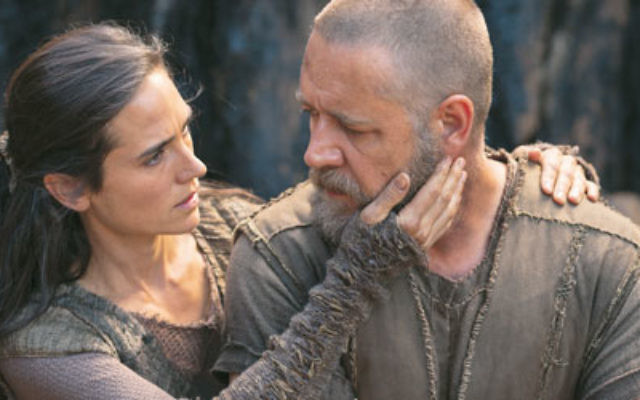Epic Noah has a few leaks
FILM REVIEW by Don Perlgut. Director Darren Aronofsky, best-known for his feverish and emotionally bleak films such as Black Swan and The Wrestler, has created an apocalyptic story of undeniable beauty with his biblical epic Noah.
The Jewish director paints a broad canvas, even venturing to illustrate the creation of the earth and replay the story of Adam and Eve.
The early part of the film sees Noah – the last righteous man on earth – wandering with his family in a landscape of depravity, debauchery and ecological disaster, increasingly haunted by hallucinations of tragedies to come. These images, and later ones of the large rectangular ark, are powerful and truly memorable.
Russell Crowe stars in the title role as a brooding, highly conflicted man driven into heroic action. He gives one of his best performances in years, oddly reminiscent of his Gladiator role; who would have thought of Noah as an action figure?
Jennifer Connelly, who won an Oscar for A Beautiful Mind, plays Noah’s wife Naameh; Emma Watson plays Shem’s wife Ila; Anthony Hopkins is Noah’s wizard-like grandfather Methuselah; Ray Winstone plays Noah’s nemesis Tubal-Cain and Logan Lerman, Douglas Booth and Leo Carrell portray the sons Ham, Shem and Japheth.
Aronofsky’s lack of “final cut” (full artistic control) of his film – held by the film studio Paramount – may have caused some of the film’s unevenness in tone and story.
The resulting experience is part art film that is stunningly beautiful to look at, part biblical epic and part action movie, complete with a climactic battle scene straight from The Lord of the Rings.
That the three parts of this film fit together uncomfortably is not a fault of trying too little, but attempting too much with a story that comprises only a handful of pages in the Bible.
Despite Paramount’s attempts to woo the Christian audience (especially in the United States), Noah the film is the biggest Jewish film epic to screen in decades.
Although both Aronofsky and co-writer Ari Handel identify publicly as atheists, both were raised in Conservative Jewish families and worked on their vision for the film through what they describe as “Jewish Midrash”, researching extensively through Jewish texts, apocryphal books and even the Dead Sea Scrolls.
Noah changes the biblical story in a number of significant ways that may drive viewers to read the original story in Genesis. One of the strangest inclusions is a major elaboration of “The Watchers” (the “Nephilim”, or “fallen ones” from Genesis 6:4). These large stone creatures (partly out of Harry Potter and partly from the Transformers series, complete with voices of Nick Nolte and Frank Langella) are angry with humans, but agree to assist Noah in making the ark and protecting him.
While the Bible tells us that Noah’s three sons bring three wives on board the ark, in the film only one son does – and she’s pregnant. Aronofsky’s fanatical Noah believes that they are all doomed to die anyway, setting the scene for significant family tensions (to say the least).
Unlike the biblical narrative (forgive the minor spoiler), there is a human stowaway on the ark.
In Noah, every character sports some version of a British accent (Crowe frequently sounded Australian to me). This follows a long tradition of accents in biblical epics: British accents work well for Americans (still the primary audience for this film), giving them just enough “remove” to pass as “ancient”. The word “God” is never mentioned, with everyone simply referring to “the Creator”.
Noah is a dark, messy but rich and entertaining cinematic experience.
Noah is currently screening.
PHOTO of Jennifer Connelly and Russell Crowe in Noah.


comments